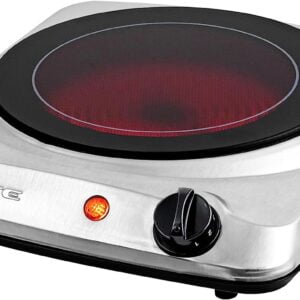What is Electric Induction Cooktop?
Electric induction cooktops are a type of cooking appliance that uses electromagnetic induction to directly heat the cooking vessel, unlike traditional electric or gas cooktops that heat indirectly through a heating element or flame. Induction cooktops have gained popularity due to their efficiency, safety, and precise control of cooking temperatures.
Here’s how an induction cooktop works:
Induction technology: The cooktop generates an oscillating magnetic field just above its surface. When an induction-compatible cookware (usually made of ferromagnetic material like cast iron or stainless steel) is placed on the cooktop, the magnetic field induces an electric current in the cookware.
Heat generation: The induced electric current generates heat within the cookware’s base. This heat is then transferred to the food inside the cookware, cooking it.
Benefits of electric induction cooktops:
Faster cooking: Induction cooktops heat up quickly, often faster than gas or traditional electric cooktops. The heat is directly transferred to the cookware, so there’s minimal heat loss.
Energy-efficient: Induction cooking is more energy-efficient because it directly heats the cookware and its contents, wasting less energy compared to other cooking methods.
Precise temperature control: Induction cooktops offer precise temperature control, making it easier to maintain specific cooking temperatures for various recipes.
Safety: Induction cooktops are generally safer to use than gas or electric cooktops. The cooktop surface remains relatively cool during cooking, reducing the risk of burns. Also, they usually have features like auto-shutoff and pan detection.
Easy to clean: Since the cooktop surface doesn’t get as hot as traditional cooktops, spills are less likely to burn and stick. The smooth glass surface is easy to wipe clean.
However, there are a few considerations to keep in mind:
Cookware Compatibility: Induction cooktops only work with induction-compatible cookware, which means it should have a magnetic base. Non-magnetic cookware, like aluminum or copper, won’t work unless they have an induction-compatible base.
Initial cost: Induction cooktops can be more expensive to purchase than traditional electric or gas cooktops. However, their energy efficiency may help save money in the long run.
Noise: Some induction cooktops may produce a slight humming noise during operation, particularly at high power levels. This noise can vary depending on the model.
Overall, induction cooktops offer a modern and efficient way of cooking that appeals to many home cooks due to their speed, precision, and safety features.


